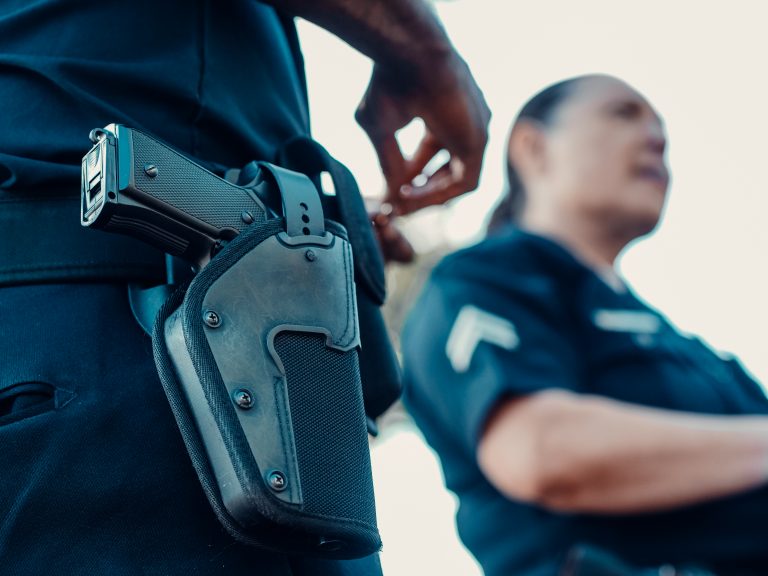In what has tragically become all too commonplace in the United States, another mass shooting incident has been carried out by an individual who displayed numerous warning signs before attacking.
A lone attacker, armed with a rifle, killed 18 people and wounded 13 more in separate shootings in a bowling alley and a bar in Lewiston, Maine, Wednesday night. The suspect has not yet been apprehended, and more details will inevitably be released in the coming days. But local law enforcement officials have already revealed that the suspected gunman was evidently committed to a mental institution earlier this year and had a recent track record of erratic and threatening behavior leading up to the attack.
“According to law enforcement, Card recently reported mental health issues to include hearing voices and threats to shoot up the National Guard Base in Saco, ME,” a Maine Information and Analysis Center bulletin stated. “Card was also reported to have been committed to mental health facility for two weeks during summer 2023 and subsequently released.”
The Associated Press later provided more details on the suspect’s mental health commitment. The outlet said it occurred after he exhibited concerning behavior during a training exercise with his Army Reserve unit.
“A U.S. official said Card was training with the Army Reserve’s 3rd Battalion, 304th Infantry Regiment in West Point, New York, when commanders became concerned about him,” the AP reported. “State police took Card to the Keller Army Community Hospital at West Point for evaluation, according to the official, who was not authorized to publicly discuss the information and spoke to The Associated Press on condition of anonymity.”
The AP’s account, if true, indicates that the shooter slipped through a web of federal and state laws designed to keep people in his exact circumstances from obtaining firearms.
Current federal law, specifically 18 U.S.C. § 922(g)(4), makes it a felony offense for any person who has been “adjudicated as a mental defective” or who has been “committed to a mental institution” to possess or receive a firearm. A corresponding provision, 18 U.S.C. § 922(d)(4), also makes it a crime to sell a gun to someone who meets that criteria. The Department of Justice considers someone to have been committed to a mental institution if that person “has been formally committed to a mental institution by a court, board, commission, or other lawful authority” on an involuntary basis.
While not a certainty, it seems likely someone who was ordered by military personnel and escorted by state police officials to a mental hospital for two weeks might fit the bill. If so, federal law would preclude him from even possessing firearms for the rest of his life.
Beyond federal safeguards, Maine has its own state law ostensibly designed to catch and disarm people who are unstable. The state in 2019 adopted a so-called yellow flag law to allow law enforcement officials to temporarily confiscate weapons from people deemed a threat to themselves or others.
While similar in nature to the “red flag” laws on the books in 21 states and Washington D.C., Maine’s law was adopted with sweeping bipartisan support thanks to some added safeguards not included in other temporary confiscation laws. It only allows law enforcement to initiate a proceeding, rather than family members or other peers, and it specifically requires a professional medical evaluation of the individual after they are taken into protective custody. Only then is the matter brought before a judge, who can then decide whether or not to issue a temporary gun confiscation order.
Critics have charged that the law and its procedural hurdles are too restrictive to be effective, and gun-control advocates have seized on the Lewiston attack to call for a full red-flag law, among other restrictions. However, based on the preliminary information available, there’s little reason to think the current law would not apply to this suspect. If indeed the state police escorted him to a multi-week mental health commitment, especially after he had made verbal threats of carrying out a mass shooting, that would seem like a prime opportunity to initiate a yellow flag proceeding.
Law enforcement officials were already involved. A mental health evaluation took place. The only thing missing, at least based on current information, is that a formal petition was never filed by the parties charged with supervising the suspect. Had they done so, there is a good chance that a court would have ordered the disarmament of the suspect months before he ever had an opportunity to carry out his attack. Indeed, local reporting on Maine’s yellow flag law implementation has documented its use on numerous individuals exhibiting similar behavior in the last year.
Of course, many questions surrounding the incident remain. Government officials did not provide further details on the suspect’s background during a Thursday press conference. For instance, nothing has yet been revealed on how and when the suspect acquired the gun used in the shooting. And it isn’t clear whether or not his time in a mental hospital qualified as a formal involuntary commitment that would have triggered federal prohibition or whether state police at any point attempted but failed to get a yellow flag order.
But the incident appears to be yet another frustrating case of a mass shooter slipping through the cracks when, in hindsight, he should have been stopped before his rampage ever began.







2 Responses
At this point, I don’t think “slipped through the cracks” is appropriate. More like “escorted through the cracks”, because their political masters need all of these incidents they can generate to justify confiscation.
I strongly disagree. There’s zero evidence of any kind of conspiracy to let this mass shooting happen.